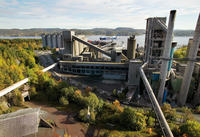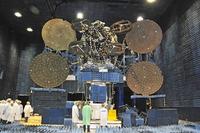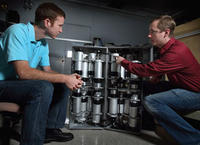-
Study ties conflict risk in sub-Saharan Africa to climate change, socioeconomics, geography
A massive new study indicates there is a statistical link between hotter temperatures generated by climate change and the risk of armed conflicts in sub-Saharan Africa. A research team assessed more than 78,000 armed conflicts between 1980 and 2012 in the Sahel region of Africa — a semi-arid belt just south of the Saharan Desert that spans about 3,000 miles and more than a dozen countries from the Atlantic to the Indian oceans. The team was looking for links between armed conflicts and temperature and rainfall anomalies, as well as assessing other causes of violence in the Sahel.
-
-
Energy engineers call for new, less restrictive regulatory framework for fracking
Leading energy engineers are suggesting that U.K. regulations on the surface vibrations caused by shale gas fracking are unnecessarily restrictive. The engineers state in a new paper that widely applying restrictions similar to those currently in force on fracking would require a ban on heavy vehicles from passing houses or walking on wooden floors. They also state that the threat of serious earthquakes caused by fracking activity is considerably lower than commonly feared.
-
-
New technology reduces cost to capture carbon

The U.S. Department of Energy’s Savannah River National Laboratory (SRNL) has signed an Exclusive Rights Agreement with Partnering in Innovation, Inc. of Orlando, Florida, in support of new carbon capture technology. Originally developed at SRNL, this approach will help open global markets for cost-effective industrial carbon dioxide (CO2) capture and re-use.
-
-
Sea level rise threatens California coastal infrastructure
Officials in Humboldt County, California are preparing for sea level rise, which experts say could threaten utilities and U.S. highway 101. The National Research Councilwarns that California, Oregon, and Washington could experience twelve inches of sea level rise by 2050 and thirty-six inches by 2100. Sea level on Humboldt Bay has increased by eighteen inches over the past century due to increasing tide elevation and subsidence. Gas, electrical, and water transmission lines are all buried in the farmlands behind dikes that fortify the shoreline.
-
-
Generating fuel from sunlight
Researchers have made significant progress towards developing a process of Artificial Photosynthesis (AP) that could replace the use of fossil fuels in the future. AP is the industrial process of preparing fuels and chemicals from nothing more than carbon dioxide, water and sunlight. It is a vital process that would be the foundation of a world that would no longer need fossil fuels.
-
-
Boeing completes testing of new anti-jamming technology

Boeing says it has proven its new anti-jamming communications technology is capable of operating as either a ground-based user terminal or satellite-based networking hub, enabling the military to send and receive secure communications at a significantly lower cost by using existing terminals and satellites.
-
-
As drought continues, more Californians turn to greywater
California’s rainy season tends to run from October to late March, but for the third year in a row rain has been relatively absent, meaning that the state is currently suffering from a severe, unprecedented drought. With increasing water rates, a growing number of homeowners in Southern California are relying on greywater systems to support their landscapes and toilet flushing. “If the drought continues, honestly, I could see all new construction will have greywater systems of some kind because it really doesn’t make sense to put usable water in the sewer system,” says one expert.
-
-
Cockroach cyborgs use microphones to detect, trace sounds in collapsed buildings
Researchers have developed technology that allows cyborg cockroaches, or biobots, to pick up sounds with small microphones and seek out the source of the sound. The technology is designed to help emergency personnel find and rescue survivors in the aftermath of a disaster. The researchers have also developed technology that can be used as an “invisible fence” to keep the biobots in the disaster area. “In a collapsed building, sound is the best way to find survivors,” says one of the researchers.
-
-
Schools review lockdown protocols for active shooter scenarios
Schools across the country are reviewing their lockdown protocols for active shooter scenarios. In Santa Fe, New Mexico, Ortiz Middle School is encouraging educators to not only gather students within their care to safety, but if necessary to fight off an attacker if the situation permits. On 9 October, school principal Steve Baca ordered a lockdown after a security guard discovered a gun in a student’s backpack. Immediately, English teacher Alexandra Robertson locked students in her classroom, got them to help barricade the door, and she was prepared to use any object including books and chairs to fed off anyone who might try to enter the classroom.
-
-
NASA facilities across U.S. vulnerable to climate change
The National Aeronautics and Space Administration (NASA) has been at the forefront of climate science, launching satellites that take the pulse of Earth’s land, oceans, and atmospheric systems, gathering data on climate, weather, and natural hazards. The agency, however, is itself increasingly vulnerable to the effects of a changing climate. Hurricane Isabel partially flooded the Langley Research Center in Virginia in 2003; Hurricane Frances damaged the Kennedy Space Center in Florida in 2004; and Hurricane Katrina damaged buildings at the Stennis Space Center in Mississippi in 2005, among recent incidents. Other facilities have been damaged or threatened by tornadoes and wildfires.
-
-
Harnessing artificial intelligence to search for new Ebola treatments
The University of Toronto, Chematria, and IBM are combining forces in a quest to find new treatments for the Ebola virus. Using a virtual research technology invented by Chematria, a startup housed at U of T’s Impact Center, the team will use software that learns and thinks like a human chemist to search for new medicines. Running on Canada’s most powerful supercomputer, the effort will simulate and analyze the effectiveness of millions of hypothetical drugs in just a matter of weeks.
-
-
Tensions over Islam find their way to U.S. campuses
University of Central Florida(UCF) professor Dr. Jonathan Matusitz is facing backlash from some groups which claim that his class on terrorism and communication is based on a biased view and a hatred of Islam. Students at the University of California-Berkeleybegan to protest the university’s selection of television personality Bill Maher as the mid-year commencement speaker on 20 December, describing his comments on Islam as racist, divisive, and offensive to many students. UCF says it stands behind Matusitz, and UC-Berkeley says Maher’s invitation stands.
-
-
Hungarian red mud spill did little long-term damage

The aftereffects of the 2010 red mud spill that threatened to poison great swathes of the Hungarian countryside have turned out to be far less harmful than scientists originally feared. The disaster happened when weeks of heavy rain caused a dam to collapse at a containment facility in Ajka in Western Hungary. It released around a million cubic meters of toxic sludge into the Torna-Marcal river system, onto the Hungarian plain and ultimately into the Danube. The mud, a byproduct of refining aluminum from bauxite ore, was dangerously alkaline, extremely salty and contained potentially toxic metals like chromium and vanadium.
-
-
Mental-health apps may reduce number of mass shooting events
Between 1982 and 2011, mass shootings occurred every 200 days on average. S since 2011, mass shootings have occurred every sixty-four days on average. Mass shootings have one thing in common: the culprits all suffered from mental illness and the condition was known to at least one person. New mobile app educates the public about mental illness and provides local and national resources for early intervention and treatment.
-
-
Sandia Lab’s mobile neutron imager shines in urban emergency response exercise

A nuclear device has been hidden in a high-rise building in a major metropolitan area. Emergency responders have intelligence that narrows down the location to a single city block, but it is not safe to search door-to-door. Can they identify the exact location of the device quickly without the culprits realizing a search is on? The answer is a definite yes. Sandia Lab’ mobile imager of neutrons for emergency responders (MINER) system did just that at an emergency response exercise in downtown Chicago earlier this year. The exercise used a sealed laboratory radiation source that mimics the radioactive signature of more nefarious material.
-
More headlines
The long view
New Technology is Keeping the Skies Safe
DHS S&T Baggage, Cargo, and People Screening (BCP) Program develops state-of-the-art screening solutions to help secure airspace, communities, and borders
Factories First: Winning the Drone War Before It Starts
Wars are won by factories before they are won on the battlefield,Martin C. Feldmann writes, noting that the United States lacks the manufacturing depth for the coming drone age. Rectifying this situation “will take far more than procurement tweaks,” Feldmann writes. “It demands a national-level, wartime-scale industrial mobilization.”
How Artificial General Intelligence Could Affect the Rise and Fall of Nations
Visions for potential AGI futures: A new report from RAND aims to stimulate thinking among policymakers about possible impacts of the development of artificial general intelligence (AGI) on geopolitics and the world order.
Smaller Nuclear Reactors Spark Renewed Interest in a Once-Shunned Energy Source
In the past two years, half the states have taken action to promote nuclear power, from creating nuclear task forces to integrating nuclear into long-term energy plans.
Keeping the Lights on with Nuclear Waste: Radiochemistry Transforms Nuclear Waste into Strategic Materials
How UNLV radiochemistry is pioneering the future of energy in the Southwest by salvaging strategic materials from nuclear dumps –and making it safe.
Model Predicts Long-Term Effects of Nuclear Waste on Underground Disposal Systems
The simulations matched results from an underground lab experiment in Switzerland, suggesting modeling could be used to validate the safety of nuclear disposal sites.
